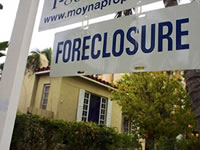Mortgage News
Loan Modifications
Mortgage Modification Madness (Part 2)
by Nancy Osborne, COO of ERATE®
While too much effort has been placed on bailing out Wall Street not enough attention has been focused on assisting distressed homeowners facing the prospect of defaulting on their mortgage and subsequent foreclosure. A stream of voluntary programs set up to modify mortgages has seen little success as less than 10% of borrowers eligible to participate in the latest program, the government's $75 billion Making Home Affordable, have achieved a modification of their loan. The sheer volume of applications and consumer requests for help has simply overwhelmed loan servicers who were unprepared to move quickly from program announcement to program execution. Though counseling and servicing staff levels have increased across the board, training workers to implement a program that all the players are unfamiliar with has taken time. Financial incentives promoting the program have been limited to a couple thousand dollars to the mortgage servicer for every modified loan completed.
Under the Making Home Affordable program, several options are presented to distressed homeowners: 1) Borrowers who cannot keep up with their current mortgage payment can modify their loan and lower their payment by cutting the interest rate and extending the term of the loan. 2) Borrowers who are able to make their payment, yet are unable to take advantage of the current lower interest rates because they have an insufficient amount of equity in their home to refinance, are permitted to refinance as long as their mortgage does not exceed 125% of the current value of their home. Other key qualifiers to participating in either program: the homeowner must have a conforming loan (max of $729,750) that is owned by one of the two GSEs, Fannie Mae or Freddie Mac, and the property must be an owner occupied primary residence of no more than 1-4 units and the problem loan must have closed prior to 2009. In order to determine whether your loan has been acquired by Fannie Mae or Freddie Mac, you may contact your loan servicer (they should be able to tell you) or check the program's website and complete the forms available to determine your eligibility. Go to:
http://makinghomeaffordable.gov/loan_lookup.html
The Making Home Affordable program has achieved slow success in part by design, as a 3 month trial loan modification period has been implemented prior to the permanent loan modification occurring. As the trial loan modifications achieve success, they are then transitioned into permanent modifications. Reports also show that over half of the loans now being modified under the program have received a reduction in payment equivalent to at least 20% or more. The results of the program now speak for themselves when compared with the results of other foreclosure prevention programs. The Making Home Affordable program, which targets Fannie Mae and Freddie Mac Loans exclusively, has a delinquency rate of 3.5% contrasted with an industry average delinquency rate of 8%.
For those distressed homeowners who do not have a loan owned by Fannie Mae or Freddie Mac, there is still help available. The Hope Now Alliance, a consortium of lenders, servicers and investors, launched by the government back in 2007, is also working to improve its achievement record by conducting workshops around the country aimed at meeting directly with distressed homeowners. According to officials at Hope Now, at a recent homeowner workshop, approximately one-third of the distressed homeowners who requested help were approved for loan workouts while attending the workshop.
The Hope for Homeowners program, launched by the government in 2008, is geared towards helping borrowers who are struggling with making their current mortgage payment however may be able to refinance into a new loan insured by the Federal Housing Administration (FHA). For more information go to:
http://www.hud.gov/hopeforhomeowners/
The non-profit organization, Neighborhood Assistance Corporation of American (NACA), has received a lot of attention for their strong-arm tactics leading to success in persuading lenders to modify unaffordable mortgages and even achieve principal reductions through their Home Save program. For more information go to:
https://www.naca.com/refinance/refinanceTenStep.jsps
Hopefully the recent successes achieved in foreclosure prevention can be built upon and applied more quickly to benefit distressed homeowners regardless of who is servicing or owns their loan. Sufficient time has passed that a trial and error period should come to an end and all parties to the mortgage process: lenders, servicers and investors should be on the same page with the borrower in making every effort to keep them in their home.
Follow the link to continue reading the related articles.
Mortgage Default Rates High after Loan Mods
More Mortgage Help on the Way?
New FHA Program Launches: Details, and How to Apply
Lending Standards Stricter Industry Wide
 Nancy Osborne has had experience in the mortgage business for over 20 years and is a founder of both ERATE, where she is currently the COO and Progressive Capital Funding, where she served as President. She has held real estate licenses in several states and has received both the national Certified Mortgage Consultant and Certified Residential Mortgage Specialist designations. Ms. Osborne is also a primary contributing writer and content developer for ERATE.
Nancy Osborne has had experience in the mortgage business for over 20 years and is a founder of both ERATE, where she is currently the COO and Progressive Capital Funding, where she served as President. She has held real estate licenses in several states and has received both the national Certified Mortgage Consultant and Certified Residential Mortgage Specialist designations. Ms. Osborne is also a primary contributing writer and content developer for ERATE.
"I am addicted to Bloomberg TV" says Nancy.
Fannie Mae & Jumbo Mortgage Rates
Just One Click! = Current Rate Chart


